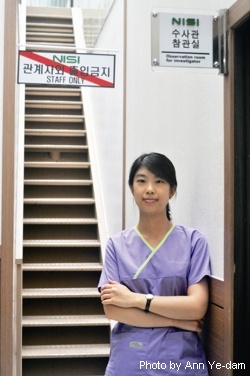
There are doctors who care for the sick and heal the dying. At the same time, there are doctors who scan the lives of the dead; those include forensic scientists working for the National Forensic Service (NFS) who solve cold cases with scientific and medical expertise. Among those, we can find Cheong Ha-rin (’00, Medical School).
Since April 2011, Cheong has begun each work day by reviewing cases of those who had died the day before, observing crime scene photos, and studying the testimony of people concerned with the case before actually conducting an autopsy. When working on a case, two researchers and a photographer form a team.
“The type of autopsy forensic scientists do is different from mere dissection. Forensic scientists always deal with humans whose cause of death needs to be revealed,” Cheong said.
Before conducting an autopsy, forensic scientists have interviews with the police about the case. As the precise cause of death cannot be indicated easily, the process of analyzing the case and appointing specific factors is challenging for forensic scientists. This is because “they cannot find the truth, but can reach near the truth.”
A single word from a forensic scientist can change the entire direction of the investigation and determining the cause of death can lead to identifying the murderer. Thus it could be said that forensic scientists are integral part in every aspect of every crime scene.
Cheong first experienced conducting an autopsy during Cheong’s residency training; like most of the medical studentsat first, she was shocked because she had to be with a dead body, which is a seemingly creepy situation.
Then Cheong was surprised again when she discovered there was a job whose description included the anatomization and analysis of the state of a dead body in order to decipher the cause of death.
“It does not just involve opening up a person’s body, but also opening the life of a human being,” Cheong said.
The world of forensic science is very attractive for Cheong in that a forensic scientist must look for clues of what happened before an individual’s death in addition to a detailed accounting of the condition of the damaged corpse.
As a result, the person’s whole life should be comprehended.
Having a desire to pursue social justice, Cheong once dreamed of majoring in law and admired people who solved cold cases; being a forensic scientist seemed the perfect balance for all of her interests and skills.
“As you see in my case of finding the job, it is important for a person to know what he or she really longs for,” Cheong said.
From this experience, she refused an offer of professorship at Ewha despite her parents’ strong objection, since being a forensic scientist was everything she wanted.
To be a successful forensic scientist, one should be curious about various aspects of the world and read as many books as possible in order to expand their understanding of how others might live and see life in the broadest sense possible.
The ability to analyze a crime scene is also required for forensic scientists as they have to blend in all the results from diverse sources of information provided by different departments inside the NFS, including medicine, zoology and hypnology departments.
“It is hard to classify forensic science into one specific field of study since it is not only a mixture of law and science but is also closely related to various forms of professions,” Cheong said.
According to Cheong, there are two types of autopsy that forensic scientists are unwilling to do; one is the case of a child, and the other is the case of an acquaintance with a forensic scientist.
When asked about a particularly difficult case, Cheong recalled the autopsy of a 17-month-old girl who was physically abused by her own mother as the most heartbreaking experience.
The baby was found dead in a messy room of her young parents’ home, who were only in their 20s. In that dirty small place, the girl finished her very short 17-month-old life with bruises and scars on her bony body.
“When I do this job, I encounter the darkest side of the society that drives the poor and the weak into dangerous and desperate fate that nobody wants to face. Sometimes I am frustrated by the society where many horrible accidents occur,” Cheong said.
Based on her personal experiences, Cheong gave an advice for Ewha students who are yearning for their dreams to come true.
“Knowing yourself as precisely as possible will lead you to know what you want to do. Choices and opportunities only come to those who are prepared and ready to be successful,” Cheong said.

